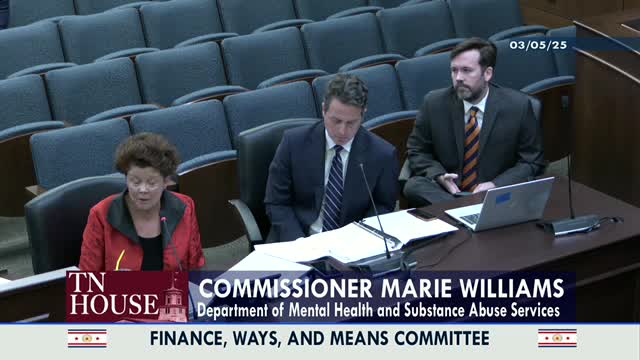Tennessee DHS seeks tech and childcare investments; officials describe $155 million in skimmed SNAP benefits and $8 million reimbursed
Get AI-powered insights, summaries, and transcripts
Subscribe
Summary
At a March 5 budget hearing, the Department of Human Services requested recurring and nonrecurring funding for IT modernization, childcare expansion and child support enforcement, and reported widespread SNAP EBT 'skimming' that federal reimbursement briefly covered.
Deputy Commissioner Whitney Page told the House Finance, Ways and Means Committee on March 5 that the Department of Human Services is seeking several recurring and nonrecurring appropriations for fiscal 2026 to modernize technology, expand childcare access and support child support enforcement.
“We're going to go ahead and let you get we will control the microphones up here. … Our first budget ask is going to be for 12,900,000.0 state dollars recurring, and this is for ongoing, maintenance and investment and department's technology,” Deputy Commissioner Whitney Page said during her presentation.
Page outlined nine principal requests the department presented to the committee: $12,900,000 recurring for information‑technology maintenance and cloud/mainframe costs; $5,900,000 recurring to expand Smart Steps childcare subsidy eligibility; $7,200,000 recurring to expand the wages program that supplements early‑childhood staff compensation; $15,000,000 nonrecurring for a Child Care Improvement Fund to cover capital and other costs not allowed by federal funds; $10,900,000 nonrecurring to expand a partnership with Boys & Girls Clubs to serve low‑income youth; $8,300,000 recurring to bridge child support enforcement funding gaps; $1,500,000 recurring for county office rentals; funding to maintain the Kids Central website; and $171,000 recurring in statutorily required step increases for assistant district attorneys in the child support program.
On the Boys & Girls Club proposal, Assistant Commissioner Callan Baggett described contracting and deliverable expectations, saying allocation will be tied to attendance and that a share will be distributed to clubs that serve new children: “the allocation will be based on average daily attendance as reported yearly by the clubs, and 10% will be distributed upon completion of the funding cycle and distributed to clubs who served new kids in a proportionate manner.”
The department said it expects the Boys & Girls Club partnership and other federal COVID‑relief supported efforts to expand access. The department also said its pre‑licensure unit, created in August 2021 to help new providers navigate licensing, has helped add over 21,000 childcare slots and expand county coverage from 35 to 51 counties.
Deputy Commissioner Page and other DHS officials described how the department will use a portion of the IT ask for ongoing cloud and mainframe transition costs as they complete a multi‑year migration and roll out program enhancements.
Committee members also pressed DHS about SNAP (Supplemental Nutrition Assistance Program) EBT fraud commonly called “skimming.” DHS officials told the committee that, during the federal skimming reimbursement window, about $155 million in SNAP benefits were reported as stolen in Tennessee and that roughly $8 million was reimbursed to affected recipients under a short‑term federal reimbursement program. DHS said that federal authorization to reimburse skimmed benefits expired in the most recent continuing resolution and that the department is continuing to track incidents in cooperation with federal partners and law enforcement.
DHS witnesses described state steps to reduce future losses, including working with EBT vendors on customer protections (card controls via apps, PIN management) and with retailers and enforcement partners. Committee members asked for comparative national data; DHS said it would follow up with more detailed cross‑state comparisons and historic totals.
On food access more broadly, DHS said it will not continue federal Summer EBT in the same form but that the governor proposed $3,000,000 in state funds to fill targeted gaps in summer meal access this year by loading cards for children in counties underserved by summer‑meals sites.
Several lawmakers praised the department’s child‑care initiatives and asked for follow‑up on spending and slot creation tied to federal deadlines for COVID relief funds; DHS said the department is tracking invoices and expects federal deadlines to be met. Committee members also raised questions about application fraud, recertification timelines and SNAP fraud response procedures; DHS described verification steps, internal quality‑control and an Office of Inspector General that reviews alleged fraud.
Committee staff asked the department for follow‑up on the precise unspent balances of prior grants, detailed performance measures for the proposed Boys & Girls Club contracts and aggregate skimming data beyond the federal reimbursement window.
DHS officials closed by asking the committee to consider the department’s nine funding priorities as part of the FY2026 budget process.
